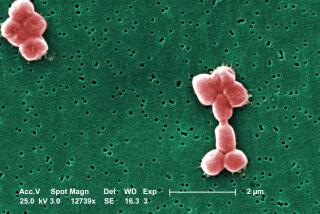The real dirt on super soaps
- Share via
The products: In past ages, people generally didn’t wash their hands until they had an obvious reason, perhaps involving livestock or topsoil. Or both.
But in these germ-conscious times, removing dirt is almost an afterthought when we step up to the sink. Our main goal is the total and utter destruction of E. coli, salmonella, campylobacter, rhinoviruses and any other germs that might have the nerve to make us sick.
Regular soap doesn’t kill many germs directly. (In fact, some bacteria will happily live in goopy soap dishes.) Instead, it loosens the grime and oil that give germs a place to hide. When you scrub soapy hands under running water, germs run down into the sink along with the suds. It’s an extremely effective way to clean your hands.
But as the war against germs escalated over the years, it was probably inevitable that someone would try to boost the killing power of soap. Many liquid hand soaps (such as Dial Complete and Softsoap Antibacterial) now contain small amounts of triclosan, a germ-fighting compound that’s chemically similar to alcohols such as rubbing alcohol. In addition to hand soaps, triclosan also can be found in antibacterial toothpastes, mouthwashes and deodorants, as well as in toys and trash bags.
Antibacterial soaps don’t look, feel or smell any different than regular hand soaps. There’s not much difference in cost, either. Expect to pay roughly $3 for a 7.5-ounce pump bottle.
The claims: Packaging for Dial Complete antibacterial soap says it “protects your family better than ordinary liquid hand soap.” The Dial website further escalates that claim: “Dial Complete is over 10 X [times] more effective at killing disease-causing germs than ordinary liquid soaps.” According to the Softsoap website, its antibacterial liquid hand soap is “clinically proven to eliminate 99% of the germs your family encounters.”
The bottom line: Antibacterial soaps may give consumers an added sense of security, but “they don’t seem to provide a benefit above and beyond ordinary soap,” says Allison Aiello, an assistant professor of epidemiology at the University of Michigan School of Public Health.
Aiello and colleagues recently surveyed 27 separate studies that investigated the effectiveness of soaps containing triclosan. Some studies looked at rates of infectious diseases; others measured levels of bacteria that lingered on hands after washing. As the researchers will report in an upcoming issue of the journal Clinical Infectious Diseases, they found no evidence that antibacterial soaps prevent more illnesses or remove more germs than regular soap.
Triclosan really is a germ-killer, which is why hospital workers often use triclosan-based soaps, especially in Europe. But the hospital-strength soaps generally contain more than twice as much triclosan as commercially available soaps. At triclosan levels found in American products, it would take a Howard Hughes-type effort to get any advantage. One study found that a soap containing typical levels of triclosan did outperform regular soap -- after 18 thorough hand washes a day for five days straight.
The verdict on effectiveness may be in, but researchers are still divided on another matter: the potential risks of antibacterial soaps. Aiello points to several laboratory studies suggesting that triclosan can help bacteria build up resistance to commonly used antibiotics such as methicillin and erythromycin. Because of these potential risks, Aiello says, regular soap would be a better choice.
But Emily Sickbert-Bennett, a public health epidemiologist at the University of North Carolina School of Public Health who has studied antibacterial soaps, says there’s “no good evidence” that triclosan has encouraged antibiotic resistance in the real world. She says consumers can safely use antibacterial soaps without worrying about creating super-bugs.
Antibiotic resistance is probably a distant concern for most consumers. What they really want is the germs gone. By that standard, antibacterial soaps and regular ones are a wash.
--
Is there a consumer product you’d like the Healthy Skeptic to examine? E-mail the details to [email protected].
More to Read
Eat your way across L.A.
Get our weekly Tasting Notes newsletter for reviews, news and more.
You may occasionally receive promotional content from the Los Angeles Times.









